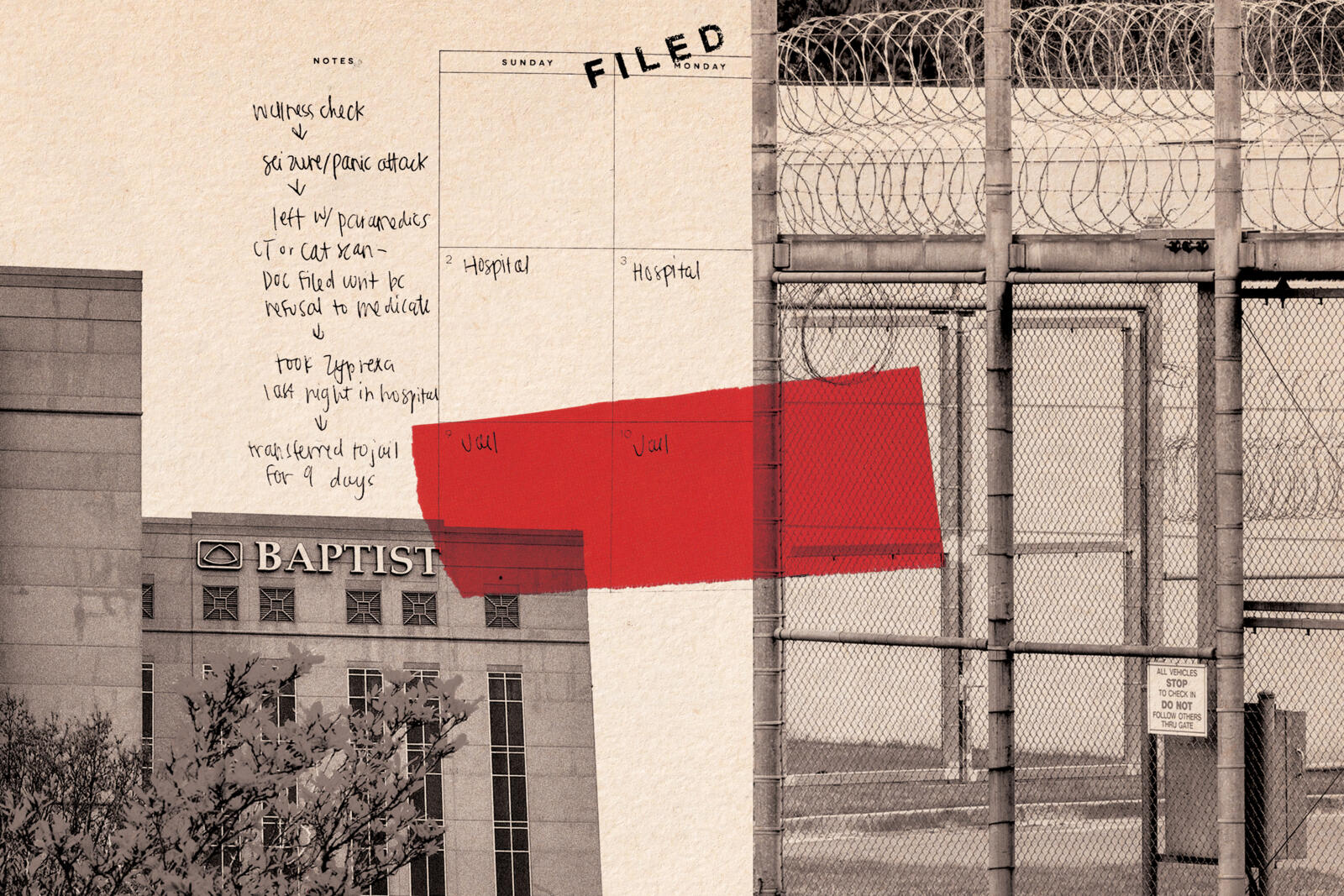Mississippi Today
This DeSoto Co. hospital transfers some patients to jail to await mental health treatment

This article was produced for ProPublica’s Local Reporting Network in partnership with Mississippi Today and co-published with the Northeast Mississippi Daily Journal, the Sun Herald and MLK50. Sign up for Dispatches to get stories like this one as soon as they are published.
If you or someone you know needs help:
- Call the National Suicide Prevention Lifeline: 988
- Text the Crisis Text Line from anywhere in the U.S. to reach a crisis counselor: 741741
When Sandy Jones’ 26-year-old daughter started writing on the walls of her home in Hernando, Mississippi, last year and talking angrily to the television, Sandy said, she knew two things: Her daughter Sydney needed help, and Sandy didn’t want her to be held in jail again to get it.
A year and a half earlier, during Sydney Jones’ first psychotic episode, her mother filed paperwork to have her involuntarily committed, a legal process in which a judge can order someone to receive mental health treatment. After DeSoto County sheriff’s deputies showed up at Sydney’s home and explained that they were detaining her for a mental evaluation, Sydney panicked and ran inside. Following a struggle, deputies cuffed and shackled her and drove her to the county jail, where people going through the commitment process are usually held as they await mental health treatment elsewhere.
Over nine days in jail, Sydney Jones said, she believed her tattoos were portals for spiritual forces and felt like she had been abandoned by her family. In an interview, she said that the experience was so traumatic that she became anxious when she drove, afraid she could be arrested at any moment.
The second time Sydney Jones experienced delusions, in 2023, a family member contacted the local community mental health center for help. Police officers with mental health training came and called an ambulance to take Jones to Baptist Memorial Hospital-DeSoto, part of a large, religiously affiliated nonprofit hospital system. But because the hospital doesn’t have a psychiatric unit, after a few days it sent her to the jail to wait for eventual treatment in a publicly funded facility. Like the first time, she hadn’t been charged with a crime.

Roughly 200 people in DeSoto County were jailed annually during the civil commitment process, most without criminal charges, between 2021 and 2023. About a fifth of them were picked up at local hospitals, according to an estimate based on a review of Sheriff’s Department records by Mississippi Today and ProPublica. The overwhelming majority of those patients, according to our analysis, were at Baptist Memorial Hospital-DeSoto, the largest in this prosperous, suburban county near Memphis.
“That would just be unthinkable here,” said Dr. Grayson Norquist, the chief of psychiatry at Grady Memorial Hospital in Atlanta, a professor at Emory University and the former chair of psychiatry at the University of Mississippi Medical Center in Jackson, Mississippi.
Norquist was one of 17 physicians specializing in emergency medicine or psychiatry, including leaders in their fields, who said they had never heard of a hospital sending patients to jail solely to wait for mental health treatment. Several said it violates doctors’ Hippocratic oath: to do no harm.
The practice appears to be unusual even in Mississippi, where lawmakers recently acted to limit when people can be jailed as they go through the civil commitment process. Sheriff’s departments in about a third of the state’s counties, including those that appear to jail such people most frequently, responded to questions from Mississippi Today and ProPublica about how they handle involuntary commitment. They said they seldom, if ever, take people who need mental health treatment from a hospital to jail. At most, said sheriffs in a few rural counties, they do it once or twice a month.
But in DeSoto County, hospital patients were jailed about 50 times a year from 2021 to 2023, according to the news outlets’ estimate, which was based on a review of Sheriff’s Department dispatch logs, incident reports and jail dockets.
At least two people have died soon after being taken from Baptist-DeSoto to a county jail during the commitment process, according to documents submitted for lawsuits filed over their deaths. One person died by suicide hours after arriving at the DeSoto County jail in 2021; the other died of multisystem organ failure after being jailed for three days in neighboring Marshall County in 2011. James Franks, an attorney who handles commitments for DeSoto County, said officials had no reason to believe that the woman who killed herself was suicidal. DeSoto County made a similar argument in a court filing in an ongoing lawsuit over that death, which didn’t name the hospital as a defendant. In lawsuits over the other death, a judge dismissed Marshall County and the sheriff as defendants, and a jury found that Baptist-DeSoto wasn’t liable.
Baptist-DeSoto officials said the hospital hands some patients over to deputies to take them to jail because those patients need dedicated treatment that the hospital can’t provide and nearby inpatient facilities are full. Most people who need inpatient treatment agree to be transferred to a behavioral health facility, according to Kim Alexander, director of public relations for Baptist Memorial Health Care Corp. But in a relatively small number of cases, she wrote in an email, patients are deemed dangerous to themselves or others and don’t agree to treatment, so they need to be committed. When that happens, she said, it’s the county’s responsibility to decide where to house them.
“We discharge mental health patients with the hope they will be transferred to a mental health facility that can provide the specialized care they need,” Alexander wrote in a statement. Jailing people who need mental health care is “not the ideal option,” she wrote. “Our hearts go out to anyone who cannot access the mental health care they need because behavioral health services are not available in the area.”
But doctors elsewhere said even if psychiatric facilities are full, Baptist-DeSoto doesn’t have to send patients to jail. They said the hospital could do what hospitals elsewhere in the country do: keep patients until a treatment bed is available.
“This is a principle of emergency medicine: You care for all people, under all circumstances, at any time,” said Dr. Lewis Goldfrank, who spent 50 years working in emergency medicine, including at Bellevue Hospital in New York City. Sending patients to jail because of their illness, he said, “is just unethical and irresponsible.”
Sandy Jones said she was in disbelief when it happened to her daughter. If Sydney has another psychotic episode, Sandy Jones said she won’t try to get help in DeSoto County. “I will tie her up until it’s over.”

Headed to Jail in a Hospital Gown and Handcuffs
Baptist, the largest and oldest hospital in DeSoto County, sits right off the interstate amid big-box stores and chain hotels in Southaven, Mississippi. It’s the first place many residents think of when they need medical help. Since 2017, it has served as the drop-off point for the county’s crisis intervention team, which was established to give law enforcement a way to help people with mental illness without bringing them to jail.
But when people show up in the emergency department needing inpatient psychiatric treatment, they don’t get it at Baptist-DeSoto. Instead, a crisis coordinator sets about finding some other place for them. If patients agree to treatment, they may be able to go to a publicly funded crisis unit, the closest of which is 50 miles away, or to a private psychiatric hospital. If they don’t, the crisis coordinator pursues commitment, which means turning patients over to the Sheriff’s Department. And because the Sheriff’s Department usually won’t transport patients over a long distance multiple times for a court hearing and eventual treatment, those patients usually go to jail.
That was the case with Sydney Jones. After she arrived at the hospital in April 2023, a psychiatrist contracted by the hospital evaluated her and concluded that she needed inpatient treatment. Jones was prescribed antipsychotic medication, admitted to the hospital, placed in her own room and monitored by a security guard.
Meanwhile, a staffer for Region IV, the local nonprofit community mental health center that works with Baptist-DeSoto to place patients who need treatment, was trying to find someplace for Jones other than the hospital. Catherine Davis, the crisis coordinator, concluded that Jones would need to be committed.

The next day, Davis contacted Jones’ cousin, who had tried to get Jones help, and asked the cousin to initiate commitment proceedings. (Region IV’s contract with Baptist-DeSoto requires it to try to get a patient’s family member or friend to file commitment paperwork before doing so itself.) The cousin refused because she knew Jones would be jailed until a bed opened up, according to Sandy Jones. (The cousin declined an interview request.)
So Davis filed the commitment paperwork herself, writing that Sydney Jones “should be taken to DeSoto County jail” while awaiting further evaluations, a court hearing and eventual treatment.
On Sydney Jones’ fourth day at Baptist-DeSoto, two sheriff’s deputies arrived. They received discharge papers from a nurse and wheeled Jones out of the hospital, according to her and an incident report. Jones, who said her delusions at the time were “like if Satan made goggles and put them on you,” was terrified that the deputies would drive her to a field, rape her and kill her.
Sandy Jones said she didn’t understand why she had no say in what was happening to her daughter, although that’s typical during the commitment process. “I felt like she was kidnapped from me,” Sandy Jones said. Her daughter spent nine days in jail before being admitted to a crisis unit, where she was treated for about two weeks.
Mississippi Today and ProPublica interviewed five other people who were discharged from Baptist to jail, including two who had been taken to the hospital because they had attempted suicide. One said that when deputies came to his room, he wondered if he had somehow committed a crime after trying to kill himself by overdosing on prescription medication. Another said he felt humiliated to be wheeled through the hospital wearing just a hospital gown. Three of the five said they were handcuffed before being taken away.
Hospital officials noted that all patients are medically stabilized before being released and that some patients are committed by family members. Dr. H. F. Mason, Baptist-DeSoto’s chief medical officer, said in an interview that he didn’t know how often patients who need behavioral health treatment might be discharged to jail, but he has no concerns about the practice. When hospital staff hand patients over to local authorities, Mason said, “we feel that they’re going to take the appropriate care of that patient.”
The jail, however, offers minimal psychiatric treatment, if any. Region IV staff members visit the jail primarily to evaluate people going through the commitment process or to check on people on suicide watch, Region IV Director Jason Ramey said. Jail officials said medical staff try to make sure inmates have access to their prescription drugs, although some people jailed during commitment proceedings have said they didn’t consistently get their medications.
Davis and county officials involved in the commitment process said sending patients to jail as they await treatment is better than allowing them to go home, which they see as the only other option. Jail is “not ideal, but we’ve got to make sure these people are safe so they’re not going to harm themselves or somebody else,” Davis said. “If they’ve had a serious suicide attempt, and they’re just adamant they’re going home, I mean — I can’t ethically let them go home. … We do try to explore all the options before we send them there.”
Once in jail, many patients wait days or weeks to be evaluated further, to go before a judge and to be taken somewhere for treatment, according to a review of jail dockets. One 37-year-old man picked up at Baptist-DeSoto in 2022 was jailed for nearly two months, which according to jail dockets was one of the longest detentions between 2021 and 2023.

The husband of a 64-year-old woman said that during the evaluation process he was encouraged by someone at Baptist-DeSoto — he doesn’t remember who — to pursue commitment proceedings after his wife stopped taking her bipolar disorder medication and overdosed on prescription drugs and alcohol. She was jailed for 28 days.
“I’m a Jehovah’s Witness,” said the woman, who asked not to be identified because she doesn’t want people to know she was jailed for mental illness. “I never known anything like that in my life. Never been arrested. All my rights just stripped from me. To do that to an old woman, because I was having mental troubles!”
She said the experience left her terrified to seek mental health care in DeSoto County. “I’d rather die than go back in there,” she said of the jail.
DeSoto County Struggles with a Problem Other Communities Have Addressed
Although DeSoto County has long relied on its jail to house people awaiting treatment, some communities elsewhere in the state have found other options. They rely on nearby crisis units to provide short-term treatment and in many cases have arrangements with local hospitals to treat patients if a publicly funded bed isn’t available.
On the Gulf Coast, people who come to hospitals in Ocean Springs or Pascagoula can be admitted to an eight-bed psychiatric unit, said Kim Henderson, director of emergency services for Singing River Health System, which operates those facilities.
Henderson said the psychiatric unit loses money because many patients lack insurance and can’t pay. “It would be so much easier to say we’re not going to do this anymore and shut it down,” she said. “But we don’t believe that’s the right thing to do.”
Over the years, DeSoto County officials have expressed frustration with how many people are jailed during the commitment process, but they’ve made little progress in coming up with an alternative.
In 2007, Baptist-DeSoto initiated 152 commitments, according to board meeting minutes and a news story in the DeSoto Times-Tribune; many of those patients went to jail. The hospital sends people “as quickly as they can to the Sheriff’s Department. They want them out of there,” Michael Garriga, then the county administrator, said at the time, according to another Times-Tribune article. (The news stories didn’t include a comment from the hospital; Alexander, Baptist’s spokesperson, said she couldn’t comment on practices from years ago because no one who was part of the leadership team then is still around.)

In 2008, the CEO of Parkwood Behavioral Health System, which operates a psychiatric facility in the county, offered to treat people going through the commitment process for $465 per patient per day — many times more than the $25 a day it cost back then to house someone in jail. No contract was ever signed.
Two years later, again aiming to reduce how often people awaiting mental health treatment were jailed, DeSoto County started working with a different community mental health center, Region IV. The number of people held in jail during commitment proceedings fell sharply, but within several years it had risen.
In 2021, the state Department of Mental Health said it would give Region IV money to create a crisis unit in DeSoto, the largest county in the state without one. But the county must provide the building, and it has taken about two years just to move forward with a location, according to meeting minutes.
County officials considered putting the crisis unit in a building a few miles from the hospital and even got an architect to scope out a renovation, according to meeting minutes. By 2023, those plans had been scuttled amid concerns about the cost of renovations and opposition from neighbors, according to Mark Gardner, a county supervisor, and board meeting minutes.
Former Sheriff Bill Rasco said he was told by an alderman for the city of Southaven that residents didn’t want people with mental illness in their neighborhood. Rasco, who served from 2008 through 2023, said he believes the rapidly growing county has had the means to build a facility, but supervisors prioritize paving roads and keeping taxes low. “We build agricultural arenas, walking trails and ballfields, and we let our mental health suffer,” he said.
The county Board of Supervisors inched forward again in February, voting to hire an architect to draw up plans to renovate a different county building. But construction on the 16-bed facility won’t start until spring 2025 at the earliest.
Gardner, who was first elected in 2011, said he has always believed that people with mental illness shouldn’t be jailed, but the Sheriff’s Department and Region IV didn’t propose an alternative until recently. “We need it today,” he said. “I hate that we haven’t been able to find a suitable place till now to put this.”
A year after Sydney Jones’ second psychotic episode, she’s doing better. She hasn’t experienced another mental health crisis. The sight of a police cruiser no longer triggers a panic attack, though she does get anxious when she sees one in her neighborhood.
But she wants to remind herself of what she survived to get here, so she keeps mementos. The composition book where she wrote notes during group therapy at the crisis unit. The Bible she read in jail. The planner where she wrote “Hospital” in one square and “Jail” in the next. And two plastic wristbands: The white one identified her as a hospital patient; the yellow one, with her mug shot and booking number, identified her as a prisoner.

How We Reported This Story
To report this story, we obtained DeSoto County Sheriff’s Department logs from 2021 through 2023 that showed when deputies were called to two local hospitals to take people into custody for involuntary commitment proceedings to receive treatment for mental illness or substance abuse. Those logs included nearly 200 calls, mostly to Baptist Memorial Hospital-DeSoto.
To determine which calls resulted in jail detentions, we needed to cross-reference the logs with incident reports and county jail dockets. We requested incident reports for about half of calls from 2021 through 2023. Although this sample wasn’t collected at random, we requested records from a range of months to account for possible variations throughout the year. Patients’ names were redacted from incident reports, but by using other identifying information in those reports, we matched 76% of the call logs in our sample to an entry in jail dockets. The remaining calls included not just those for which we couldn’t match an incident report to a jail docket entry, but also those for which there was no incident report or the patient was taken to a crisis unit or a private psychiatric hospital.
Based on that percentage and the volume of calls during the three-year period, we estimated that about 23% of the roughly 650 people jailed during the civil commitment process in DeSoto County had been picked up at a local hospital. Again, the overwhelming majority were taken from Baptist-DeSoto. To ensure that our estimate was conservative and accounted for any variation due to our sample, we characterized this as about one-fifth of civil commitment jail detentions. We shared our preliminary findings with hospital and county officials; no one disputed them.
To determine how the number of people jailed during commitment proceedings in DeSoto County has changed over time, we obtained jail dockets dating back to 2007. We don’t have data for 2009 and 2010 because of a file storage issue at the Sheriff’s Department.
Agnel Philip of ProPublica contributed reporting. Mollie Simon of ProPublica contributed research.
This article first appeared on Mississippi Today and is republished here under a Creative Commons license.![]()
Did you miss our previous article…
https://www.biloxinewsevents.com/?p=362139
Mississippi Today
On this day in 1911


Dec. 21, 1911

Josh Gibson, the Negro League’s “Home Run King,” was born in Buena Vista, Georgia.
When the family’s farm suffered, they moved to Pittsburgh, and Gibson tried baseball at age 16. He eventually played for a semi-pro team in Pittsburgh and became known for his towering home runs.
He was watching the Homestead Grays play on July 25, 1930, when the catcher injured his hand. Team members called for Gibson, sitting in the stands, to join them. He was such a talented catcher that base runners were more reluctant to steal. He hit the baseball so hard and so far (580 feet once at Yankee Stadium) that he became the second-highest paid player in the Negro Leagues behind Satchel Paige, with both of them entering the National Baseball Hame of Fame.
The Hall estimated that Gibson hit nearly 800 homers in his 17-year career and had a lifetime batting average of .359. Gibson was portrayed in the 1996 TV movie, “Soul of the Game,” by Mykelti Williamson. Blair Underwood played Jackie Robinson, Delroy Lindo portrayed Satchel Paige, and Harvey Williams played “Cat” Mays, the father of the legendary Willie Mays.
Gibson has now been honored with a statue outside the Washington Nationals’ ballpark.
This article first appeared on Mississippi Today and is republished here under a Creative Commons license.![]()
Mississippi Today
On this day in 1958


Dec. 20, 1958

Bruce Boynton was heading home on a Trailways bus when he arrived in Richmond, Virginia, at about 8 p.m. The 21-year-old student at Howard University School of Law — whose parents, Amelia Boynton Robinson and Sam Boynton, were at the forefront of the push for equal voting rights in Selma — headed for the restaurant inside the bus terminal.
The “Black” section looked “very unsanitary,” with water on the floor. The “white” section looked “clinically clean,” so he sat down and asked a waitress for a cheeseburger and a tea. She asked him to move to the “Black” section. An assistant manager followed, poking his finger in his face and hurling a racial epithet. Then an officer handcuffed him, arresting him for trespassing.
Boynton spent the night in jail and was fined $10, but the law student wouldn’t let it go. Knowing the law, he appealed, saying the “white” section in the bus terminal’s restaurant violated the Interstate Commerce Act. Two years later, the U.S. Supreme Court agreed. “Interstate passengers have to eat, and they have a right to expect that this essential transportation food service,” Justice Hugo Black wrote, “would be rendered without discrimination prohibited by the Interstate Commerce Act.”
A year later, dozens of Freedom Riders rode on buses through the South, testing the law. In 1965, Boynton’s mother was beaten unconscious on the day known as “Bloody Sunday,” where law enforcement officials beat those marching across the Selma bridge in Alabama. The photograph of Bruce Boynton holding his mother after her beating went around the world, inspiring changes in voting rights laws.
He worked the rest of his life as a civil rights attorney and died in 2020.
This article first appeared on Mississippi Today and is republished here under a Creative Commons license.![]()
Mississippi Today
‘Something to be proud of’: Dual-credit students in Mississippi go to college at nation’s highest rate

Mississippi high school students who take dual-credit courses go to college at the nation’s highest rate, according to a recent report.
It’s generally true that students who take college classes while in high school attend college at higher rates than their peers. Earlier this year, a study from the Community College Research Center at Teacher’s College, Columbia University found that nationally, 81% of dual-credit students go to college.
In Mississippi, that number shoots up to 93%, meaning the vast majority of the state’s high school students who take college classes enroll in a two- or four-year university.
“When we did this ranking, boom, right to the top it went,” said John Fink, a senior research associate and program lead at the research center who co-authored the study.
State officials say there’s likely no silver bullet for the high rate at which Mississippi’s dual-credit students enroll in college. Here, “dual credit” means a course that students can take for both high school and college credit. It’s different from “dual enrollment,” which refers to a high school student who is also enrolled at a community college.
In the last 10 years, participation in these programs has virtually exploded among Mississippi high school students. In 2014, about 5,900 students took dual-credit courses in Mississippi, according to the Mississippi Community College Board.
Now, it’s more than 18,000.
“It reduces time to completion on the post-secondary level,” said Kell Smith, Mississippi C0mmunity College Board’s executive director. “It potentially reduces debt because students are taking classes at the community college while they’re still in high school, and it also just exposes high school students to what post-secondary course work is like.”
“It’s something to be proud of,” he added.
There are numerous reasons why Mississippi’s dual-credit courses have been attracting more and more students and helping them enroll in college at the nation’s highest rate, officials say.
With a few college credits under their belt, students may be more inspired to go for a college degree since it’s closer in reach. Dual-credit courses can also build confidence in students who were on the fence about college without requiring them to take a high-stakes test in the spring. And the Mississippi Department of Education’s accountability model ensures that school districts are offering advanced courses like dual credit.
Plus, Mississippi’s 15 community colleges reach more corners of the state, meaning districts that may not be able to offer Advanced Placement courses can likely partner with a nearby community college.
“They’re sometimes like the only provider in many communities, and they’re oftentimes the most affordable providers,” Fink said.
Test score requirements can pose a barrier to students who want to take dual-credit courses, but that may be less of a factor in Mississippi. While the state requires students to score a 19 on ACT Math to take certain courses, which is above the state average, a 17 on the ACT Reading, below the state average of 17.9, is enough for other courses.
Transportation is another barrier that many high schools have eliminated by offering dual-credit courses on their campuses, making it so students don’t have to commute to the community colleges to take classes.
“They can leave one classroom, go next door, and they’re sitting in a college class,” said Wendy Clemons, the Mississippi Department of Education’s associate state superintendent for secondary education.
This also means high school counselors can work directly with dual-credit students to encourage them to pursue some form of college.
“It is much less difficult to graduate and not go to college when you already possess 12 hours of credit,” Clemons said.
Word-of-mouth is just as key.
“First of all, I think parents and community members know more about it,” Clemons said, “They have almost come to expect it, in a way.”
This all translates to benefits to students. Students who take dual-credit courses are more likely to finish college on time. They can save on student debt.
But not all Mississippi students are benefiting equally, Fink said. Thr research center’s report found that Black students in Mississippi and across the country were less likely to pursue dual-credit opportunities.
“The challenge like we see in essentially every state is that who’s in dual enrollment is not really reflective of who’s in high school,” Fink said.
Without more study, it’s hard to say specifically why this disparity exists in Mississippi, but Fink said research has generally shown it stems from elitist beliefs about who qualifies for dual-credit courses. Test score requirements can be another factor, along with underresourced school districts.
“The conventional thinking is (that) dual enrollment is just … another gifted-and-talented program?” Fink said. “It has all this baggage that is racialized … versus, are we thinking about these as opportunities for any high school student?”
Another factor may be the cost of dual-credit courses, which is not uniform throughout the state. Depending on where they live, some students may pay more for dual-credit courses depending on the agreements their school districts have struck with local community colleges and universities.
This isn’t just an equity issue for students — it affects the institutions, too.
“You know, we’ve seen that dual-credit at the community college level can be a double-edged sword,” Smith said. “We lose students who oftentimes … want to stay as long as they can, but there are only so many hours they can take at a community college.
Dual-credit courses, which are often offered at a free or reduced price, can also result in less revenue to the college.
“Dual credit does come at a financial price for some community colleges, because of the deeply discounted rates that they offer it,” Smith said. “The more students that you have taking dual-credit courses, the more the colleges can lose.”
State officials are also working to turn the double-edged sword into a win-win for students and institutions.
One promising direction is career-technical education. Right now, the vast majority of dual credit students enroll in academic courses, such as general education classes like Composition 1 or 2 that they will need for any kind of college degree.
“CTE is far more expensive to teach,” Clemons said.
Smith hopes that state officials can work to offer more dual-credit career-technical classes.
“If a student knows they want to enroll in career-tech in one of our community colleges, let’s load them up,” Smith said. “Those students are more likely to enter the workforce quicker. If you want to take the career-tech path, that’s your ultimate goal.”
This article first appeared on Mississippi Today and is republished here under a Creative Commons license.![]()
-

 News from the South - Arkansas News Feed6 days ago
News from the South - Arkansas News Feed6 days agoFaith-inspired ministry opens health clinic in Little Rock
-

 News from the South - Florida News Feed5 days ago
News from the South - Florida News Feed5 days ago‘Dirty Dancing,’ ‘Beverly Hills Cop,’ ‘Up in Smoke’ among movies entering the National Film Registry
-

 Our Mississippi Home5 days ago
Our Mississippi Home5 days agoThe Meaning of the Redbird During the Holiday Season
-

 Mississippi Today3 days ago
Mississippi Today3 days agoMississippi PERS Board endorses plan decreasing pension benefits for new hires
-

 Mississippi Today7 days ago
Mississippi Today7 days agoOn this day in 1961
-

 Local News16 hours ago
Local News16 hours agoHard Rock Hotel & Casino Biloxi Honors Veterans with Wreath-Laying Ceremony and Holiday Giving Initiative
-

 News from the South - Missouri News Feed2 days ago
News from the South - Missouri News Feed2 days agoCould prime Albert Pujols fetch $1 billion in today's MLB free agency?
-

 Mississippi Today6 days ago
Mississippi Today6 days agoOn this day in 1976































